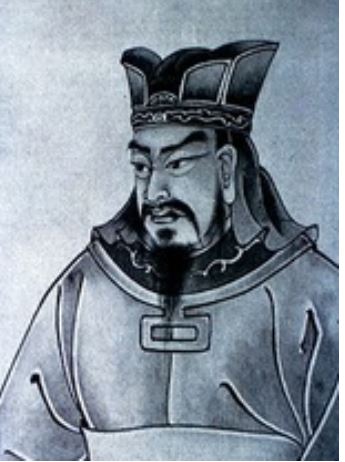Sun Tzu’s Tips for Happy Warfare

General Sun Tzu, from 6th Century China
Congress is back in town as of yesterday afternoon, though there was some confusion about that in Secretary of State Blinken’s testimony to the House via Zoom call. The Secretary participated from his office, three miles away from Capitol Hill, since he thought the House was still on vacation. There was the mess from Afghanistan still pending, though he did not want to talk about it, nor the legislation that will enable the United States to continue governing itself after Midnight on the 30th when the fiscal year dies.
They don’t seem to understand that up on the Hill, since the Committee members were all present and he wasn’t. The usual suspects at the Loading Dock are familiar with confusion, and imagine things will clarify themselves over the next tumultuous few weeks. We agreed to hold our fire on that. At least until Amazon delivers the appropriate cocktail attire with “tax the rich” embroidered across our more substantial derrières than the ones we saw on the news.
Instead, we thought we would use the morning editorial meeting to explore some old thoughts with new meanings. The recent Atlantic article had caused some mild turmoil down by the Loading Dock. The Chairman has a problem the magazine to which he had subscribed since he was a kid. Apparently he thinks they veered from something like balanced and insightful coverage of the big issues into partisanship as a sort of betrayal. We are more advanced at the Loading Dock, of course, and view sources and content as just additional factors to consider in digesting the news.
“America’s Spies Are Fighting the Last War, Again,” is the sort of article that represents something important in the continuing debate about what constitutes “truth.” We don’t know much about that these days, but Loma went back to basics to analyze it.

(Author Amy Zegart)
The author is a lady named Amy Zegart. She is a senior fellow at the Hoover Institution, among others, which raises flags for some of us. She has also authored a soon-to-be-released book called “Spies, Lies, and Algorithms: The History and Future of American Intelligence” (Princeton University Press). Her piece on the Last War is refreshing in light of the series of disasters in Southwest Asia and worth a read, since it asserts some hard truths.
DeMille naturally was willing to debate the matter on facts, while some of us still hold some old feelings. Sun Tzu was the guy who allegedly wrote the tome during the 6th Century Eastern Zhou period in China. He was a general, strategist and philosopher, combining those talents in cogent ways to which our crowd can only aspire. His masterwork was “The Art of War,” an influential work on strategy that has affected both Western and East Asian philosophy and military thinking for a thousand years.
The organizations in which we spent our careers have not adapted to changing times, as Ms Zegart notes, and even goes against some ancient wisdom. Loma had an old hard-bound copy he waves around periodically. Sun Tzu outlined what he considered reasonable approaches to the most unreasonable human form of interaction: War.
We all like one of the short lines since we can remember them. War is expensive and takes a lot of energy. Sometimes it can kill you. So, we generally agree with the ancient general on this one:
“The supreme art of war is to subdue the enemy without fighting.”
In itself, that simplicity takes a lot of energy. In fact, the other quote that reflects the level of effort is the one that brought us up short. Anyone who has been in the business of war has been around Sun Tzu’s rose bush a few times, and we wondered which old thoughts Loma would reiterate as being applicable to our strange modern times.
It did not take long. He dragged the tattered volume out of his shooting vest and flipped it open to a favorite chapter. He cleared his throat after a last gasp at his cigarette, tossing it toward the fire pit to smolder. Then he began to read:
“If you know the enemy and know yourself, you need not fear the result of a hundred battles, If you know yourself but not the enemy, for every victory gained you will also suffer a defeat. If you know neither the enemy nor yourself, you will succumb in every battle.”
Rocket laughed out loud when he concluded. “It turns out Afghanistan worked out that way, exactly. We apparently didn’t know the Taliban, and we decided our sophisticated ways were just right for a society living in Sun Tzu’s time. We hoisted an LGBT banner over our embassy to demonstrate our commitment to something viewed as apostasy by the locals. In fact, not all of us would be comfortable working in a building so labeled in the heart of a society mostly oriented toward Sun Tzu’s century, not ours. Rocket noted that ten years ago we had killed bin Laden and then run out of military reasons to be there, which put us in the realm of military ambiguity, an uncomfortable place to be.
“Isn’t that where we have one of the interns walk by with a footnote on a posterboard? The one that says “We don’t care who likes who or what clothing they choose to wear while doing it.” We accept that as a form of freedom. So that is why we succumbed?” DeMille let the question float for a moment and then continued. “Maybe a George Floyd mural on the wall in Kabul wasn’t exactly the message we thought we were sending.”
Loma slid the tattered volume back in his vest. “I will find something else Sun Tzu said about taxes to shape the rest of the discussions this week.”
We all laughed at that one, since we already don’t know who the enemy is, or who we are. We used to do better, but Sun Tzu says where we are pretty much sums it up. All of us agreed it was probably a good time to be reading some quotes. But the short one seemed to sum it up best. Of course, you would have to understand yourselves first.
Copyright 2021 Vic Socotra
www.vicsocotra.com
